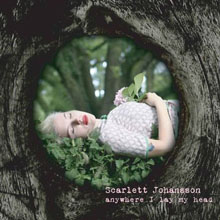
I must admit that, like many, I approached the concept of a Scarlett Johansson album of Tom Waits covers as one might approach a dollar bill dangling from a shark’s mouth. I wanted to disregard it, pretend it didn’t exist, scoff at anyone so foolish as to go near it expecting anything but an unhappy ending.
But in the secret recesses of my mind, I quietly hoped that, despite the odds, the album could actually be good and not tarnish the name of Mr. Waits—my favorite musical artist and one of the most important contributors to the great sloshing pool of noise we call music. Having finally listened to the album in all its uneven glory, I can say that the actual product is more complicated than either of my divergent expectations could have anticipated.
It’s clear from the instrumental first track that ScarJo is not the one running this show. That credit belongs to David Sitek, the album’s producer (better known as the guitarist for TV On The Radio and producer for the Yeah Yeah Yeahs). Sitek infuses the album with that sleepy, sexy, post-modern urban ambiance that fans of TVOTR know quite well. But while TVOTR singer Tunde Adebimpe can turn a detached vocal delivery into a sharpened weapon, Johansson’s disembodied vocals sound more asleep-at-the-wheel than calm-and-cool, and it is this detachment that plagues the entire album, frequently dragging it through the mud just when it tries to soar.
Johansson is not a remarkably gifted singer, and Sitek wisely keeps her vocals semi-buried in the mix. What takes center stage instead are the lush arrangements, looped drums, and slick production—elements that draw the listener in like a lover’s embrace under the sheets.
Scarlett does have some standout moments, though, like on “Fannin’ Street” (with guest vocals by David Bowie), where she ably equals Waits’ somber delivery of the song’s dire warning. And on the album’s title track, Scarlett transforms the song from a vagabond’s defiant declaration into a tale of loss and shattered dreams. She struggles more on songs like “I Don’t Want To Grow Up”, previously covered to better effect by the Ramones, where no amount of dripping reverb can give her voice the defiance required to help the song escape the realm of bad ’80s dancehall pretender.
The album ends on a surprisingly strong note with “Who Are You?”, one of Waits’ most moving songs to date. Scarlett’s voice is concealed beneath a choir of guest vocalists, and the track is the most TVOTR-sounding of them all–which gives it a cold stillness and lends a layer of shimmering heartbreak to the lyrics’ jaded skepticism.
Anywhere I Lay My Head can be a frustratingly uneven affair, and it’s easy to wish for a more capable vocalist. But Sitek has done well for himself; he has refused to let the album be just another celebrity vanity project, and his presence is felt on every track. This commitment can make Johansson’s phoned-in delivery all the more frustrating, but credit should be given to her for choosing such talented collaborators. And while she doesn’t succeed in announcing her presence as a genuine musical talent, Johansson and Sitek have delivered a rewarding album that overcomes its questionable existence and, at times, even does Mr. Waits proud.
I actually like this album. The band is great. Bowie is great.
These are Tom Waits songs. They are meant to be uneven.
I like her voice buried behind this interesting music. Reminds me of The Jesus and Mary Chain playing Catpower songs. Scarlett sings like the Shangri-Las on leader of the pack.
I don’t picture this band or Scarlett ever playing live, but it is a good LP.